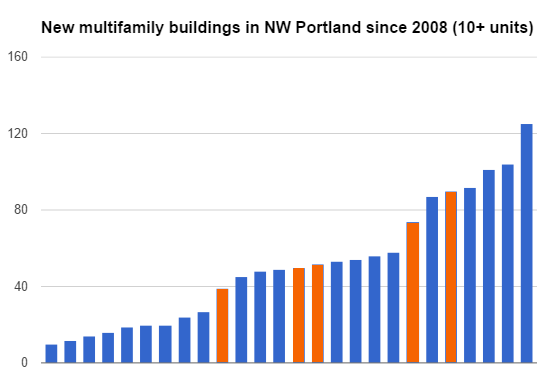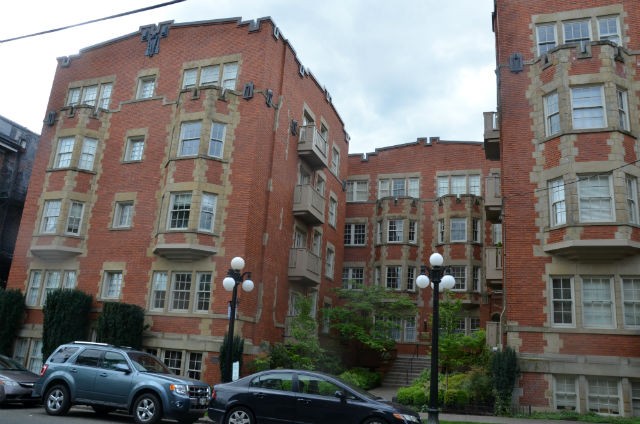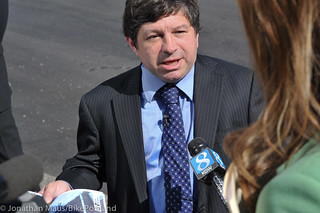
(Photo: J.Maus/BikePortland)
Five days after the city council seemed headed for a vote to mandate garages in larger transit-oriented apartment buildings in the Northwest District, it’s put the proposal on hold.
The decision came after opponents of mandatory parking organized a letter-writing campaign and then outnumbered supporters nearly three to one at the council’s Wednesday hearing.
“We’re going to keep coming up against these choices: do we want a city for people or a city for cars?” said one opponent of the mandate, Rachel Shadoan. “I want a city for people.”
She contrasted Portland with her childhood home of Oklahoma.
“My memories of Oklahoma are of endless driving and miles and miles of parking lots,” she said.
Council says permit changes might better block parking spillover
There were also dissenting voices Wednesday, as well as a general agreement that northwest Portland parking policy needs changes. Among the options discussed were higher street parking permit prices, a cap on the number of total permits issued, some sort of restriction on which buildings could be issued permits or a mandate that applied only to market-rate units.
“As long as parking is cheaper on the street than parking off street, people are going to park on the street.”
— Chris Rall
“As long as parking is cheaper on the street than parking off street, people are going to park on the street,” said Chris Rall, one of many who said parking minimums should be used only as a last resort after other measures are taken.
Four of the five council members seemed responsive to that combination of ideas. Only Commissioner Amanda Fritz said she supported parking minimums for new buildings in the district. But she withdrew that proposal without a vote after it became clear that no other commissioners were eager to endorse it.
“I’ve learned today that there’s a lot of tools at the disposal of NW that we haven’t really explored,” said Commissioner Dan Saltzman. “I don’t want to see this disappear into the ether. I think there’s a sense of urgency, at least in my mind, anyway. I think we owe people in NW one way or the other a decision very soon.”
“This hearing has caused each of us to think about this problem in new and different ways,” said Commissioner Nick Fish. “I love the suggestion that there may be a new and hybrid idea out there that’s worth exploring. I love the idea of looking for a different way of rationing and pricing.”
“Parking minimums are extremely problematic,” Commissioner Steve Novick said. “If you increase the cost of something, you increase the cost of something. There is no way that requiring parking to be built does not drive up the cost.”
Novick said it might be possible to use Northwest to “pilot” new parking permit policies.
Today, the city’s parking permit policy doesn’t cap the number of permits in a given zone. In Northwest Portland, that means a $60-per-year parking permit is sometimes referred to as a “hunting license.” Once it completes a planned expansion, Northwest District’s will have 4,700 spaces available to Zone M permit holders. The city has issued more than 9,000 Zone M parking permits.
As part of Wednesday’s action, the council agreed to make it legal to let institutions like Legacy Good Samaritan Hospital rent out their unused spaces during off-peak hours. That could free up “hundreds” of new parking stalls, a Legacy executive said.
Developer: each parking stall adds $50,000 to building cost

(Data: Bureau of Planning and Sustainability. Chart: BikePortland.)
As we reported Tuesday, city data show that most new buildings in the Northwest District over the last eight years that have at least 10 units are being built with more than they would have be required to under the proposed rules.
But a few projects, accounting for 23 percent of the area’s new housing supply over that period, have less. One large project, the Tess O’Brien Apartments that start pre-leasing 124 studios of about 330 square feet next week, has no on-site parking at all.
Some people, such as Northwest District resident Iain MacKenzie, said mandatory parking rules would block such niche projects that cater to lower and medium-income people, most of them without cars. MacKenzie, who covers the development industry on his site NextPortland.com, predicted that on-site parking would force developers to build projects with smaller numbers of higher-end units.
Advertisement
The one developer who showed up to testify Wednesday said that if the rules were passed, his firm would simply stop building anything with more than 30 units in order to avoid building any new parking.
“The cost of the parking stalls — they’re around $50,000,” said Frank Stock, vice president at MDC Construction. “If you just do the simple math, that’s decades to recover that cost.”
Others testifying in opposition to the minimums included Sarah Iannarone, who finished third in May’s mayoral primary; Margot Black, an organizer of Portland Tenants United who was speaking for herself; and Tony Jordan of Portlanders for Parking Reform, who had worked for weeks to organize opposition to the proposal.
“Northwest Portland has a toolbox full of parking management strategies at its disposal,” Jordan said. “Expanded permit zones, new meters, the recommended shared parking that we’re asking for — and pretty soon we should have better permit programs available as well. So I think there’s much less risk right now in waiting to see how these more flexible and equitable policies play out and then adjust them to work better, rather than applying a policy that might not work very much and certainly would exacerbate the housing crisis.”
Resident: Garages are needed so children can live in Northwest
Most of the handful of people who testified Wednesday in support of mandatory parking said they share the civic goals of those on the other side.
“Of course we need more housing,” said Wendy Chung. “Of course we need less cars.”
But Chung predicted that 330-square-foot studios with no on-site parking would become filled with “single professionals.” If all new buildings were required to have on-site parking, she said, then more people with children or disabilities would be able to live in the area because those people, she said, need to own cars.
Chung noted that apartments in MacKenzie’s 89-year-old building, which has no on-site parking, are renting for several hundred dollars less than smaller apartments in the new Tess O’Brien building. She said she wished that new market-rate units like Tess O’Brien weren’t allowed in her neighborhood at all — only buildings that would offer below-market rents.
Many of those backing the mandate, including three members of the Northwest Parking Stakeholder Committee, emphasized that they were asking only to be treated like the rest of the city. In 2013, the city began requiring most buildings with 30 or more units to have parking, even if they’re next to a frequent transit line.
“I see the parking minimums as a little bit of a tourniquet to stop the intense bleeding,” said Karen Karllson, a member of the committee which had voted unanimously to back the plan with new minimums included.
“I don’t remember that kind of unanimity in our past discussions,” Commissioner Fritz noted.
Novick: Citywide permit option might come to council within months
Commissioner Fish, for his part, reminded the room Wednesday that the 2013 citywide mandate was “never meant to be the final product” and tweaks might be appropriate.
“We called it an interim solution,” he said. “We’re long overdue, actually, to take a look at it. … It appears to be creating incentives to smaller-scale development, which is quite contrary to our development plan.”
One possible solution before the city is to move on a proposal that a team at the Portland Bureau of Transportation spent most of last year developing: a new residential parking permit system that would enforce parking overnight, cap the total number of permits, and could charge more than $60 per year.
Commissioner Novick said Wednesday that he had been holding back the permit policy in order to do public outreach on its thorniest question: how to decide who gets to be first in line for the limited supply of street permits. He said he expected it to come to council “within the next few months.”
— Michael Andersen, (503) 333-7824 – michael@bikeportland.org
Our work is supported by subscribers. Please become one today.




